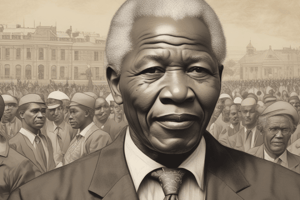Podcast
Questions and Answers
What was one of Nelson Mandela's key achievements during his presidency?
What was one of Nelson Mandela's key achievements during his presidency?
- Establishing apartheid in South Africa
- Advocating for human rights abuses
- Encouraging division among the diverse population
- Promoting economic development and social justice (correct)
What term did Nelson Mandela coin to emphasize South Africa's multiculturalism?
What term did Nelson Mandela coin to emphasize South Africa's multiculturalism?
- Rainbow Nation (correct)
- Multicultural Society
- Colorful Country
- Diverse Land
What criticism did Nelson Mandela face during his presidency?
What criticism did Nelson Mandela face during his presidency?
- Addressing widespread poverty effectively
- Promoting economic development and social justice
- Fostering unity among the diverse population
- Dealing with rampant corruption within the ANC (correct)
What event set the stage for negotiations between the ANC and the National Party government to end apartheid?
What event set the stage for negotiations between the ANC and the National Party government to end apartheid?
What was one of the challenges faced by Nelson Mandela during his presidency?
What was one of the challenges faced by Nelson Mandela during his presidency?
After his release from prison in 1990, what significant role did Nelson Mandela play in South Africa?
After his release from prison in 1990, what significant role did Nelson Mandela play in South Africa?
What was the significant achievement Nelson Mandela and F.W. de Klerk shared in 1993?
What was the significant achievement Nelson Mandela and F.W. de Klerk shared in 1993?
What political organization did Nelson Mandela co-found with the Youth League before becoming a key figure in it?
What political organization did Nelson Mandela co-found with the Youth League before becoming a key figure in it?
Where was Nelson Mandela incarcerated for nearly three decades before his release in 1990?
Where was Nelson Mandela incarcerated for nearly three decades before his release in 1990?
What event marked an important turning point in South Africa's political landscape in 1990?
What event marked an important turning point in South Africa's political landscape in 1990?
Study Notes
Nelson Mandela: From Political Prisoner to South African President
Nelson Mandela, born Rolihlahla Mandela in 1918, is a global icon known for his pivotal role in the end of apartheid in South Africa and his transformation from an imprisoned freedom fighter to the nation's first democratically elected president.
Early Life and Political Activism
Mandela, an Xhosa from the Eastern Cape, became enmeshed in the anti-apartheid movement after studying law in Johannesburg. He was a co-founder of the African National Congress's Youth League and later became a key figure in the ANC itself. He was arrested for the first time in 1956 for treason but was later acquitted. However, in 1962, Mandela was sentenced to life imprisonment for sabotage and conspiracy to violently overthrow the apartheid government.
Prison Years and International Activism
Mandela spent nearly three decades in prison, initially on Robben Island before being transferred to Pollsmoor Prison and eventually Victor Verster Prison. During this time, he became a symbol of resistance to apartheid, and his cause garnered international attention. Nelson Mandela was awarded the Nobel Peace Prize in 1993, which he shared with South African President F.W. de Klerk.
The Release and Negotiation Process
In 1990, Nelson Mandela was released from prison, marking an important turning point in South Africa's political landscape. His release set the stage for negotiations between the ANC and the National Party government to end apartheid and establish a new democratic order.
The First Election and the Rainbow Nation
In 1994, South Africa held its first non-racial elections. Nelson Mandela won the presidency with 62% of the vote, and the ANC took an overwhelming majority in Parliament. Mandela's presidency was a time of great hope and optimism. He coined the term "Rainbow Nation" to emphasize South Africa's multiculturalism and to encourage unity among its diverse population.
Key Achievements
Some of Nelson Mandela's most significant accomplishments include the adoption of a new constitution that enshrined fundamental rights and freedoms, the Truth and Reconciliation Commission, which addressed past human rights abuses, and the promotion of economic development and social justice.
Challenges and Controversies
Despite Mandela's remarkable achievements, his presidency was not without challenges. He faced criticism for his government's failure to address widespread poverty and to deal with rampant corruption within the ANC. Additionally, Mandela faced controversy after allegations surfaced that his third wife, Graca Machel, had improperly used her position for personal gain.
Legacy
Nelson Mandela passed away in 2013, leaving behind a legacy as one of the world's greatest leaders. He is revered for his unwavering commitment to justice, equality, and freedom. Mandela's life and work continue to inspire generations, and his efforts to end apartheid and promote democracy serve as an example for leaders around the world. Today, many people still look to Nelson Mandela as a symbol of hope, courage, and resilience in the face of adversity.
Studying That Suits You
Use AI to generate personalized quizzes and flashcards to suit your learning preferences.
Description
Test your knowledge on the life and legacy of Nelson Mandela, from his early political activism to becoming South Africa's first democratically elected president. Explore key events such as his years in prison, release, presidency, and lasting impact on global politics.




